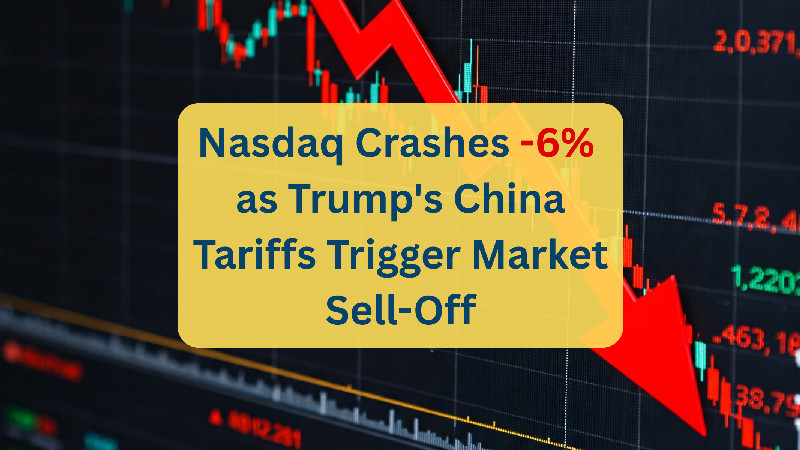Trump's Tariffs: Nasdaq Falls Nearly 6% in Market Turmoil
Published • 10 April 2025 at 5:04 PM

S&P 500, Nasdaq Fall as Trump’s Trade War with China Intensifies
US stock markets plunged on Thursday as President Trump's escalating trade war with China intensified, reversing the previous day's historic rally. The S&P 500 dropped over -5%, the Nasdaq Composite fell nearly -6%, and the Dow Jones Industrial Average lost almost 1,800 points, or more than -4.5%. The sharp decline followed the White House's confirmation that the US had increased tariffs on Chinese goods to 145%, up from the previously stated 125%. The market’s sharp sell-off came after a brief period of optimism when Trump had paused many of the largest tariff hikes on US trading partners, leading to a significant rally. However, with the trade war now focused directly on China, analysts warned that further escalation was possible, creating uncertainty in the markets. While the trade battle with China intensifies, other tariffs, including 10% duties on most trading partners and 25% levies on steel, aluminum, and auto imports, remain in effect. These could lead to higher prices and slower economic growth, adding pressure on the US economy. Meanwhile, March's Consumer Price Index revealed that inflation pressures eased, with prices increasing by 2.5% annually, below economists' expectations. Despite this, the ongoing trade tensions continue to weigh heavily on the market.
Nasdaq Falls Hard: China Tariff Hike Rocks US Markets
- US stock markets plunged on Thursday due to escalating trade tensions between the US and China.
- The S&P 500 dropped over -5%, the Nasdaq fell nearly -6%, and the Dow Jones lost almost 1,800 points, or over -4.5%.
- The sell-off followed the White House's confirmation that tariffs on Chinese goods had been raised to 145%, higher than the previously stated 125%.
- The market had briefly rallied after Trump paused many tariff hikes on US trading partners, but fears of further escalation with China led to uncertainty.
- Other tariffs, including 10% duties on most trading partners and 25% on steel, aluminum, and auto imports, remain in place.
- These tariffs could lead to higher prices and slower economic growth, increasing pressure on the US economy.
- March's Consumer Price Index showed inflation easing, with annual prices rising by 2.5%, below economists' expectations.
- Despite easing inflation, ongoing trade tensions continue to negatively impact market sentiment.











